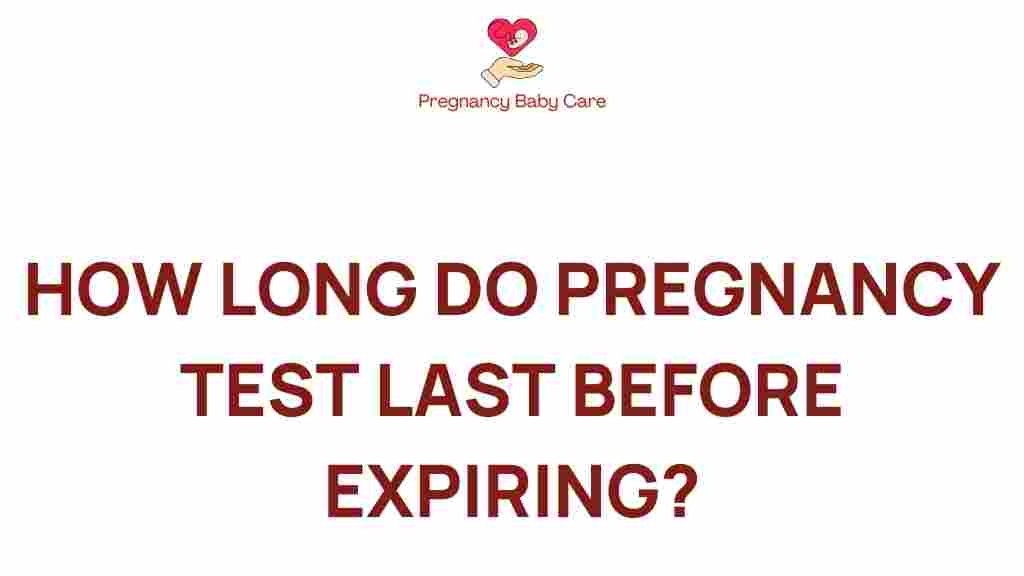The Lifespan of Pregnancy Tests: How Long Do They Really Last?
Pregnancy tests have revolutionized women’s health by providing a quick and convenient way to determine pregnancy. However, many women may wonder about the lifespan of pregnancy tests: how long do they really last? This article will explore the expiration date, accuracy, home testing methods, and test reliability, ensuring you are informed about the best practices for using pregnancy tests.
Understanding Pregnancy Tests
Pregnancy tests work by detecting the hormone human chorionic gonadotropin (hCG) in urine or blood. This hormone is produced soon after a fertilized egg attaches to the uterus, making it a reliable indicator of pregnancy. There are various testing methods available today, from home kits to laboratory tests, each with its own level of accuracy and reliability.
Expiration Date of Pregnancy Tests
One of the critical aspects to consider when using pregnancy tests is the expiration date. Most home pregnancy tests come with a printed expiration date on the packaging. This date indicates the period during which the test is guaranteed to be accurate and reliable.
- Typical Lifespan: Most pregnancy tests have a lifespan of about 1-3 years from the date of manufacture.
- Storage Conditions: Tests should be stored in a cool, dry place, away from direct sunlight to ensure their effectiveness.
- Effect of Expired Tests: Using a test after its expiration date can lead to inaccurate results, which can be misleading.
How Accurate Are Pregnancy Tests?
The accuracy of pregnancy tests is crucial, especially for early detection. Most home pregnancy tests claim to be over 99% accurate when used correctly and within the specified time frame. However, several factors can affect this accuracy:
- Timing of the Test: Testing too early can yield false negatives as hCG levels may not be high enough.
- Quality of the Test: Always opt for reputable brands that have been clinically tested.
- User Error: Following the instructions meticulously is essential for reliable results.
Step-by-Step Process for Home Testing
Using a home pregnancy test is straightforward. Here’s a step-by-step guide to ensure you get the most accurate results:
- Choose the Right Test: Select a test that has good reviews and a reputation for reliability.
- Check the Expiration Date: Always ensure that the test is not expired.
- Read the Instructions: Each brand may have different instructions; make sure to read them carefully.
- Collect Urine Sample: It’s best to use the first morning urine for the most concentrated hCG levels.
- Perform the Test: Dip the test strip or use the dropper, depending on the type of test.
- Wait for Results: Follow the manufacturer’s recommended waiting time before reading the results.
- Interpreting Results: Check for the control line and test line; a positive result typically shows two lines.
Common Troubleshooting Tips
Despite following the instructions, sometimes you might encounter issues while using pregnancy tests. Here are common troubleshooting tips:
- Negative Result with Symptoms: If you receive a negative result but still suspect pregnancy, wait a few days and test again.
- Faint Lines: A faint line may indicate early pregnancy; consider retesting after a few days.
- Invalid Results: If there’s no control line, the test may be defective or improperly used. Dispose of it and try another.
Understanding Test Reliability
Test reliability is essential when it comes to pregnancy tests. Here’s what to consider:
- Clinical Testing: Look for tests that have undergone clinical evaluations for reliability.
- Brand Reputation: Opt for well-known brands with positive reviews from users.
- Type of Test: Blood tests conducted in a healthcare setting are more accurate than most home tests.
When to Consult Healthcare Providers
If you have questions about pregnancy tests or your symptoms, it’s always a good idea to consult a healthcare provider. They can provide you with:
- Blood Tests: These can detect lower levels of hCG and confirm pregnancy earlier than urine tests.
- Ultrasound: To confirm pregnancy and check for any complications.
- Guidance on Women’s Health: Professional advice regarding prenatal care and healthy pregnancy practices.
Conclusion
Understanding the lifespan and accuracy of pregnancy tests is crucial for effective home testing. Always check the expiration date, follow the instructions carefully, and consider the testing methods available. If you have any doubts, consulting with a healthcare provider is always a wise choice for ensuring your health and the health of your baby.
For more information on women’s health and pregnancy resources, visit this comprehensive guide. Remember, early detection through reliable testing methods can make a significant difference in your pregnancy journey.
In summary, while home pregnancy tests offer convenience and privacy, knowing their limitations and the importance of expiration dates helps ensure that you receive accurate results. By being informed and proactive, you can navigate your pregnancy journey with confidence.
This article is in the category Pregnancy and created by PregnancyBabyCare Team
